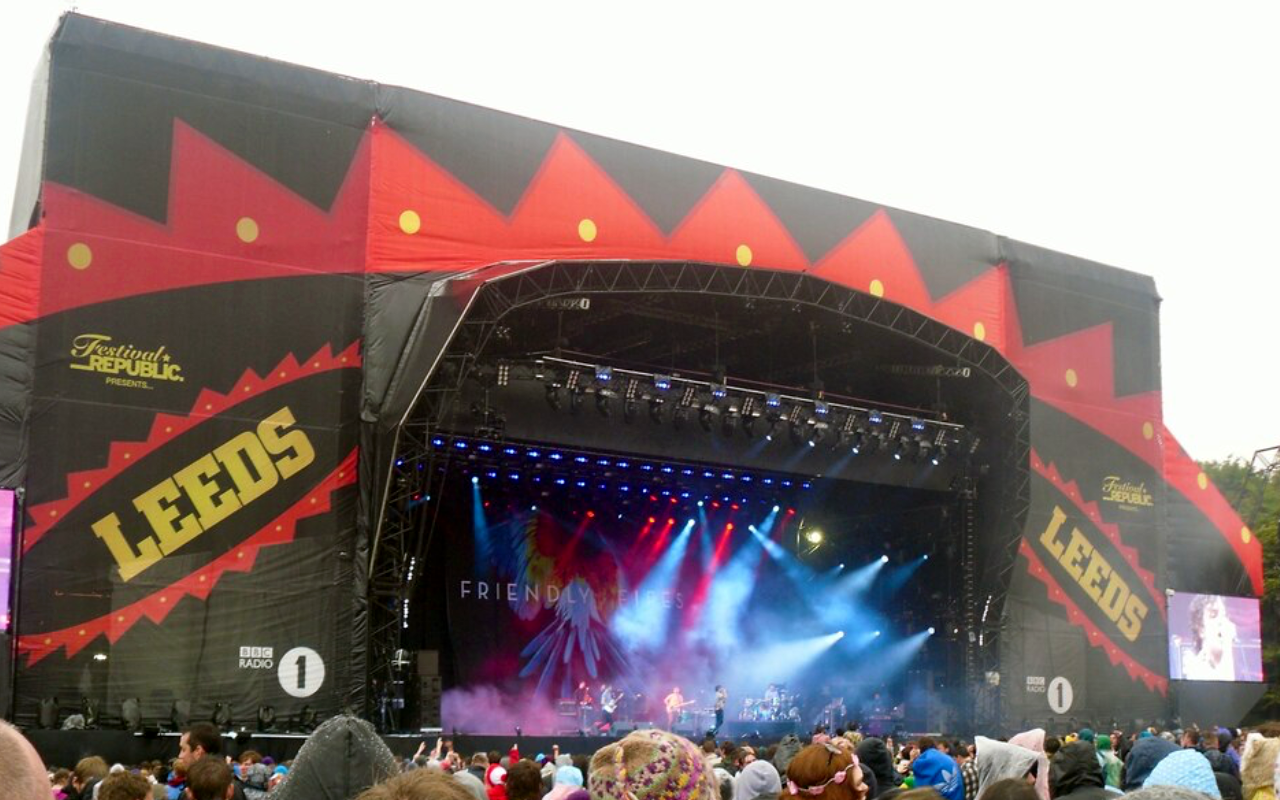
Leeds Festival could be using renewable national grid power on one stage as early as next year
Photo: Lauren
Renewable energy project to put festivals on national grid
Music Declares Emergency, in partnership with Festival Republic, will create a roadmap for live outdoor events to connect to mains energy, reducing carbon emissions.
Music Declares Emergency has announced a partnership with promotor Festival Republic for a research project with the aim of connecting festivals to renewable national grid power by 2023.
Festival Republic will fund the project to transition the UK outdoor live events sector to grid power to reduce the carbon emissions caused by temporary power generation.
The UK music promotor, which runs some of the country’s best-known summer festivals, including Leeds, Reading, Latitude and Wilderness, aims to present “fully renewably powered, grid connected stages” at three events next summer and to help create a blueprint that other promoters and event organisers can follow.
READ MORE:
- Cost of living 'jeopardising theatres and festivals', MPs told
- Scotland to tie arts funding to net zero progress
“This project will be a game changer for outdoor live events. Generating our own temporary power is the highest contributor of on-site greenhouse gas emissions at a festival, and by plugging into the grid we will reduce this significantly,” said Melvin Benn, Managing Director of Festival Republic.
Generating energy accounted for 77% of an average festival’s on-site carbon footprint in 2018, according to The Show Must Go On Report 2020, produced by Vision 2025. It found that some seven million litres of diesel are consumed by UK music festivals annually – an average of half a litre per person per day.
The report concluded that the most effective approach to reducing the impact of power provision is to use mains power, which emits 0.28 kilograms of C02 per kilowatt-hour, as opposed to 6.7 kilograms emitted by diesel generators.
In 2020, renewable electricity represented 43.1% of total generation of grid power, according to the 2021 report from Digest of UK Energy Statistics. If festivals sign up for renewable tariffs, “that will increase the amount of investment in renewables going into the grid”, said Victoria Chapman, Head of Sustainability for UK and Ireland at Live Nation.
Moving away from diesel
Lewis Jamieson, Co-Founder of Music Declares Emergency, said currently “there is no significant grid connection for any recognised large-scale live outdoor event in the UK”.
Solar and wind power can be unreliable, he said, risking power cuts at critical moments. The most environmentally friendly source of reliable non-grid power for festivals is HVO biodiesel which “reduces emissions from conventional diesel around 85 to 95%” but is difficult to source responsibly.
The grant from Festival Republic will be used to investigate the process and the costs involved in linking festival sites to the national grid – in theory a simple process of running a cable from the nearest substation to the site.
Achieving this will involve liaising with the national grid, landowners, government agencies and licencing authorities, Jamieson said, with the aim of creating a roadmap that outdoor events organisers across the U.K. can follow.
“In the short term, we're probably not going to get enough power on site to power more than one stage at Reading and at Leeds and at another venue, but it’s a start,” said Jamieson.
“It’s starting the process and [saying], ‘This is possible, it is achievable and we are going to do it,’ that seems really important at this stage.”
Creating a roadmap
Linking festival sites to the national grid will involve initial outlays but in the long-term it could lead to cost reductions for festivals, amid rising fuel prices, Jamieson said.
“The more festivals and events we can get onto the national grid for their power the better, but it is incredibly expensive to achieve if the sites are green fields in the middle of nowhere,” said Steve Heap, General Secretary of the Association of Festival Organisers.
Another complicating factor is that many festivals organisers do not own the land.
“They may be hiring from a local landowner, the National Trust, a farmer, and at the drop of a hat anytime they could lose the site. So to pay for the infrastructure for national grid power to go onto site could be lost in a year's time or two years’ time,” he said.
Jamieson said that part of the grant from Festival Republic will be used to examine “the different landownership models and work out where the barriers are in making this a reality”.
'We hope our lead will be followed'
“Festivals add an enormous amount to the campaign for sustainability, doing quite often better at recycling and energy saving than most local authorities and leading the way in many areas,” Heap said, but “the bigger festivals clearly use more power from diesel”.
“If they can afford to lay in the necessary cabling to national grid then it would be a fantastic example of what can be achieved and I hope they're able to do so,” he said.
Jamieson said it will be up to larger festivals with greater investment budgets to pave the way.
“We’ve seen this across the music industry in terms of their commitment to sustainability measures – as different things have become more standard practice, the cost per unit or the cost of delivery of those things is reduced,” he said.
Part of the initial step will be convincing government agencies and landowners that if Britain want to meet its target of net zero emissions by 2050, “we have to look at those events and come up with strategies that make them non-polluting in carbon terms”, he said
“As with many things in the climate conversation, it's possible, we know how to do it, we just need to do it, so this is the beginnings of doing it. And we hope that our lead will be followed by other outdoor live events providers.”
Join the Discussion
You must be logged in to post a comment.